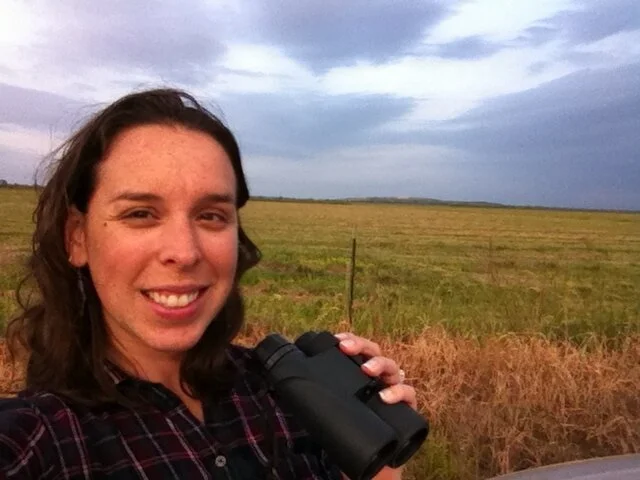Featured Woman in STEM: Jessica Schulz
Jessica Schulz is an avian ecologist who conducts research and monitoring for bird species that are threatened, endangered, or have special conservation concerns. She has a B.S. in Animal Science from the University of Vermont and an M.S. in Biology from the University of Louisiana at Lafayette. Her current work focuses on coastal populations in the Gulf of Mexico. Read below to learn about her journey into STEM, what she loves about her work, and what she’s learned about science in the process.
What got you interested in this career path?
I feel like I stumbled into this field accidentally… I honestly had no idea people worked with wildlife professionally until I was doing it myself! When I started college, I knew I wanted to work with animals but I was picturing domestic animals, which I was familiar with. I majored in Animal Science, which focused primarily on livestock, companion animals, and some exotics, and outside of coursework I worked as a vet tech and a caretaker at a show dog kennel. Before long though, I felt disenchanted with all of these options… they just weren’t very fulfilling for me.
My junior year of college I was looking for something different, so I signed up for a class called Terrestrial Wildlife, which I hadn’t noticed before because it was offered through a different department from all of my animal science classes. At first I found that confusing because wild animals are still animals right? But I soon learned that wildlife biology is a VERY different field from animal science, and it turned out to be a much better fit for me! Learning about the amazing diversity in nature and all the incredible ways wild animals and plants have evolved to thrive in their environment was eye-opening… it felt right, and the material made me feel more grounded and connected to the natural world. Plus, I discovered that it was common for early-career professionals in wildlife sciences to take seasonal jobs doing research or monitoring, which often meant traveling to new places and spending a lot of time exploring new surroundings. That did it… I was hooked!
What do you like most about your work?
I’ve always loved meeting new people and gaining new perspectives, and working in this field has allowed me to do a lot of that. It’s also given me a real sense of place, as every place I’ve worked has been different, not just in the landscape and the wildlife but also in community and culture. I enjoy learning what it’s like to live in these different places, and finding connections with people I otherwise might never have met.
I also really, really enjoy fieldwork. It can often be difficult and grueling, but it can also be so fun! In some ways it feels like I still get to be a kid, exploring and observing nature. It’s different every day, and I’m always learning something new. Sometimes, I learn things that are of interest to the broader science community. For example, a few years ago I noticed that a number of shorebirds I was seeing on our surveys were showing strange deformations in their skin and feathers, so we collected some samples and teamed up with some avian health experts to figure out what it was. We discovered that these birds were suffering a bacterial infection normally seen in livestock, which had only ever been seen in birds one other time, and never in the U.S.! We published our findings in a scientific journal.
I also like feeling like the work I do has a real purpose, like it contributes to something bigger than myself. Working on the frontlines of the Deepwater Horizon oil spill showed me we have along way to go in how we take care of our natural resources, and it also showed me that there are a lot of people out there who, like me, are committed to doing better.
Have you learned any lessons from working in STEM that you'd like to share with our audience?
I’ve learned so many things, but one thing that stands out is that even when you work with wildlife, science is all about people. The biggest threat to wildlife and their habitats is us and the way we consume space and resources. …
I’ve also learned that there are a lot of misconceptions about science, from how it’s performed to who does it. All the scientists I know, regardless of their background, education, research topics, or roles in their field, are simply awesome, hardworking people who are passionate about their work and committed to making the world a better place. … I’d like to see some of the walls come down between scientists and non-scientists and more opportunities for us to connect and work together.
I feel strongly that in order to do this, we need as many diverse minds and perspectives as possible. Within and across the many fields of science, we absolutely need to do a better job of recruiting and supporting scientists from diverse backgrounds. These fields can be competitive, and it can be hard to break in if you don’t have the same access and resources that others have. Fortunately, I think a lot of people are waking up to the value that diverse perspectives bring to science and are working to break down structural inequities, personal biases, and other barriers. But this is really important, so we have to keep our feet on the accelerator. Ultimately, when people are excluded from participating in science, we are all deprived of the contributions they could have made.



